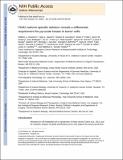| dc.contributor.author | Li, Jie | |
| dc.contributor.author | Sasaki, Mika | |
| dc.contributor.author | Horner, James W. | |
| dc.contributor.author | Burga, Laura N. | |
| dc.contributor.author | Xie, Jianxin | |
| dc.contributor.author | Jurczak, Michael J. | |
| dc.contributor.author | DePinho, Ronald A. | |
| dc.contributor.author | Clish, Clary B. | |
| dc.contributor.author | Kibbey, Richard G. | |
| dc.contributor.author | Wulf, Gerburg M. | |
| dc.contributor.author | Di Vizio, Dolores | |
| dc.contributor.author | Mills, Gordon B. | |
| dc.contributor.author | Cantley, Lewis C. | |
| dc.contributor.author | Israelsen, William James | |
| dc.contributor.author | Dayton, Talya L. | |
| dc.contributor.author | Davidson, Shawn M. | |
| dc.contributor.author | Fiske, Brian Prescott | |
| dc.contributor.author | Hosios, Aaron Marc | |
| dc.contributor.author | Bellinger, Gary | |
| dc.contributor.author | Yu, Yimin | |
| dc.contributor.author | Jacks, Tyler E. | |
| dc.contributor.author | Vander Heiden, Matthew G. | |
| dc.date.accessioned | 2017-07-10T18:31:09Z | |
| dc.date.available | 2017-07-10T18:31:09Z | |
| dc.date.issued | 2013-10 | |
| dc.date.submitted | 2013-07 | |
| dc.identifier.issn | 0092-8674 | |
| dc.identifier.issn | 1097-4172 | |
| dc.identifier.uri | http://hdl.handle.net/1721.1/110601 | |
| dc.description.abstract | The pyruvate kinase M2 isoform (PKM2) is expressed in cancer and plays a role in regulating anabolic metabolism. To determine whether PKM2 is required for tumor formation or growth, we generated mice with a conditional allele that abolishes PKM2 expression without disrupting PKM1 expression. PKM2 deletion accelerated mammary tumor formation in a Brca1-loss-driven model of breast cancer. PKM2 null tumors displayed heterogeneous PKM1 expression, with PKM1 found in nonproliferating tumor cells and no detectable pyruvate kinase expression in proliferating cells. This suggests that PKM2 is not necessary for tumor cell proliferation and implies that the inactive state of PKM2 is associated with the proliferating cell population within tumors, whereas nonproliferating tumor cells require active pyruvate kinase. Consistent with these findings, variable PKM2 expression and heterozygous PKM2 mutations are found in human tumors. These data suggest that regulation of PKM2 activity supports the different metabolic requirements of proliferating and nonproliferating tumor cells. | en_US |
| dc.description.sponsorship | National Institutes of Health (U.S.) (Grant R01CA168653) | en_US |
| dc.description.sponsorship | National Institutes of Health (U.S.) (Grant 5P01CA117969) | en_US |
| dc.description.sponsorship | National Institutes of Health (U.S.) (Grant P30CA147882) | en_US |
| dc.description.sponsorship | National Institutes of Health (U.S.) (Grant 5P30CA14051) | en_US |
| dc.description.sponsorship | National Institutes of Health (U.S.) (Grant 5K08CA136983) | en_US |
| dc.description.sponsorship | National Institutes of Health (U.S.) (Grant DK059635) | en_US |
| dc.description.sponsorship | National Institutes of Health (U.S.) (Grant R01DK092606) | en_US |
| dc.description.sponsorship | National Institutes of Health (U.S.) (Grant R00CA131472) | en_US |
| dc.description.sponsorship | National Institutes of Health (U.S.) (Grant R01GM056203) | en_US |
| dc.description.sponsorship | American Diabetes Association (Grant 7-12-BS-09) | en_US |
| dc.description.sponsorship | Smith Family Foundation | en_US |
| dc.description.sponsorship | Burroughs Wellcome Fund | en_US |
| dc.description.sponsorship | Damon Runyon Cancer Research Foundation | en_US |
| dc.description.sponsorship | Stern Family | en_US |
| dc.language.iso | en_US | |
| dc.publisher | Elsevier | en_US |
| dc.relation.isversionof | http://dx.doi.org/10.1016/j.cell.2013.09.025 | en_US |
| dc.rights | Creative Commons Attribution-NonCommercial-NoDerivs License | en_US |
| dc.rights.uri | http://creativecommons.org/licenses/by-nc-nd/4.0/ | en_US |
| dc.source | PMC | en_US |
| dc.title | PKM2 Isoform-Specific Deletion Reveals a Differential Requirement for Pyruvate Kinase in Tumor Cells | en_US |
| dc.type | Article | en_US |
| dc.identifier.citation | Israelsen, William J. et al. “PKM2 Isoform-Specific Deletion Reveals a Differential Requirement for Pyruvate Kinase in Tumor Cells.” Cell 155.2 (2013): 397–409. | en_US |
| dc.contributor.department | Massachusetts Institute of Technology. Department of Biology | en_US |
| dc.contributor.department | Koch Institute for Integrative Cancer Research at MIT | en_US |
| dc.contributor.mitauthor | Israelsen, William James | |
| dc.contributor.mitauthor | Dayton, Talya L. | |
| dc.contributor.mitauthor | Davidson, Shawn M. | |
| dc.contributor.mitauthor | Fiske, Brian Prescott | |
| dc.contributor.mitauthor | Hosios, Aaron Marc | |
| dc.contributor.mitauthor | Bellinger, Gary | |
| dc.contributor.mitauthor | Yu, Yimin | |
| dc.contributor.mitauthor | Jacks, Tyler E. | |
| dc.contributor.mitauthor | Vander Heiden, Matthew G. | |
| dc.relation.journal | Cell | en_US |
| dc.eprint.version | Author's final manuscript | en_US |
| dc.type.uri | http://purl.org/eprint/type/JournalArticle | en_US |
| eprint.status | http://purl.org/eprint/status/PeerReviewed | en_US |
| dspace.orderedauthors | Israelsen, William J.; Dayton, Talya L.; Davidson, Shawn M.; Fiske, Brian P.; Hosios, Aaron M.; Bellinger, Gary; Li, Jie; Yu, Yimin; Sasaki, Mika; Horner, James W.; Burga, Laura N.; Xie, Jianxin; Jurczak, Michael J.; DePinho, Ronald A.; Clish, Clary B.; Jacks, Tyler; Kibbey, Richard G.; Wulf, Gerburg M.; Di Vizio, Dolores; Mills, Gordon B.; Cantley, Lewis C.; Vander Heiden, Matthew G. | en_US |
| dspace.embargo.terms | N | en_US |
| dc.identifier.orcid | https://orcid.org/0000-0002-7994-7963 | |
| dc.identifier.orcid | https://orcid.org/0000-0002-7702-5877 | |
| dc.identifier.orcid | https://orcid.org/0000-0001-5785-8911 | |
| dc.identifier.orcid | https://orcid.org/0000-0002-6702-4192 | |
| dspace.mitauthor.error | true | |
| mit.license | PUBLISHER_CC | en_US |
